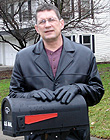
Milestones
{An Umbrella Invitational}

Milestones
{An Umbrella Invitational}

David W. Landrum
is professor of Humanities at Cornerstone University, Grand Rapids, Michigan. He has published poetry and short stories in many magazines and journals, including Web Del Sol, The Barefoot Muse, Driftwood Review, Small Brushes, and many others. He is currently at work on a series of poems about 16th Century English poet Robert Herrick and edits the online journal Lucid Rhythms. —Back to Milestones Contents/Issue Links— |
Three Meditations for the Day After Christmas
I [Originally published in Christianity and Literature] Artist’s Statement
T
his was one of the first poems I ever published. Aside from the encouragement that came from getting a poem in print, this particular work was pivotal in my development as a poet. In “Three Meditations for the Day After Christmas” I began to explore the singular power of words. Up to this point I had concentrated upon ideas or concepts as the force behind a poem, but in this piece of writing I began to see how each separate word is an isolated node of meaning, power, nuance, subtlety. No longer were words mere vehicles to convey an idea. They were raw centers of suggestion, each with a life of its own, each with an evocative energy that bordered on magic.
|
||
|
|
|||